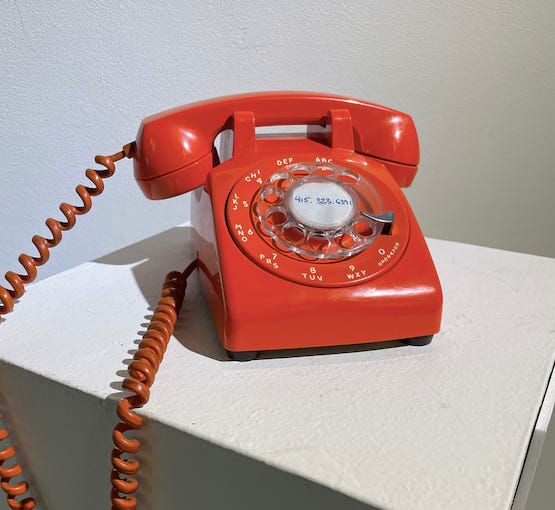In a room of dissonant voices
As we fully enter Autumn, I’m glad to send this weekly newsletter with more frequency as a way to keep sharing new writing. But today I’d like to share one final reflection on my public art project, Closure Is Not Justice, which just came a close this week.
Yesterday morning, after my last visitor left but before I began taking the work down from the walls and packing it up, I stood in the middle of the room for a final moment.
There are four audio-visual components of this multimedia exhibition, and without intending to, I ended up standing right in the middle of those four pieces and could hear the voices coming from each one equally.
The first voice came from an old police scanner playing the actual dispatcher recording from the night that the massive explosion killed six firefighters. As I stood there listening, the voices on the recording were saying:
“We’re going to need a lot of ambulances up on that hill.”
“10-4. Are the ambulances for the firefighters?”
“10-4.”
The second voice came from a television playing the Unsolved Mysteries episode that aired seven years after the explosion, which generated tips and leads to arrest whoever set the fires. The voice of the host Robert Stack is what I heard while I stood there: “These fires were deliberately set, which means this is nothing less than cold-blooded murder.”
The third voice came from an old telephone, and it was the voice of Bryan Sheppard, one of the five people who went to federal prison for the crime. Standing there, I could hear Bryan’s voice saying, “The night of the explosion I was passed out on my parents’ couch next to my pregnant girlfriend . . . I was at home, asleep.”
The fourth and final voice came from another television playing old news clips. One of the clips was of the moment right after Bryan, his best friend Richard, his uncles Skip and Frank, and Frank’s girlfriend Darlene had been convicted of setting the fires that caused the explosion. Exiting the courthouse in handcuffs, Frank could be heard saying, “This is wrong. This is totally wrong. We didn’t do this!”
What kept me standing there yesterday, listening to those four dissonant voices, was similar to what drew me to this particular case in the first place more than a decade ago: It is so intimately tied to my own dissonant experiences of how personal and collective memories are shaped, especially when it comes to systems and institutions we want so desperately to place our faith in. Whose voices shape us the most?
When it comes to stories of justice, it’s easy to believe in some sort of linear narrative arc, such as when a crime occurs, a suspect is caught and brought to trial, a punishment is set, and “justice” is served. The end. As someone who has always been drawn to the teachings of Dr. King, it’s felt like some sort of ethical imperative for me to also believe that the “moral arc of the universe is long, but it bends toward justice.”
As a writer of prose, I understand linear narrative arc. One word, one sentence following another. Moving in a direction, guiding the reader forward. Rising action, climax, falling action, denouement. It bends in certain ways and might wind all over the place but, like a maze or a labyrinth, has a path toward an end.
But it actually seems that memory and the decisions we make as a society come as a result of sometjing more similar to standing in the middle of a room, listening in the midst of numerous dissonant voices, no longer being able to withstand the tension and the dissonance, and being drawn toward one voice over the rest. Which voice is loudest, which is most compelling, which one promises the thing you want, or can persuade you to believe they know what you want?
I’m no longer convinced of such directionality when it comes to the long-expired belief that our society’s arc bends toward justice. The universe’s moral arc? Yes. Absolutely. But I’ll save another day to discuss the differences between my faith in a sacred Source and the farce that is our system of justice. For now, I’ll simply say that what seems to seize hold of the narrative of justice is not a deterministic fate as Dr. King believed of the created universe itself, but rather, when it comes to American justice, whichever voice among many can drown out the others and vanquish the dissonance wins, brings the story to an end, and offers closure.
But closure is not justice.
And hope is such a small thing.
Peace,
Andrew








